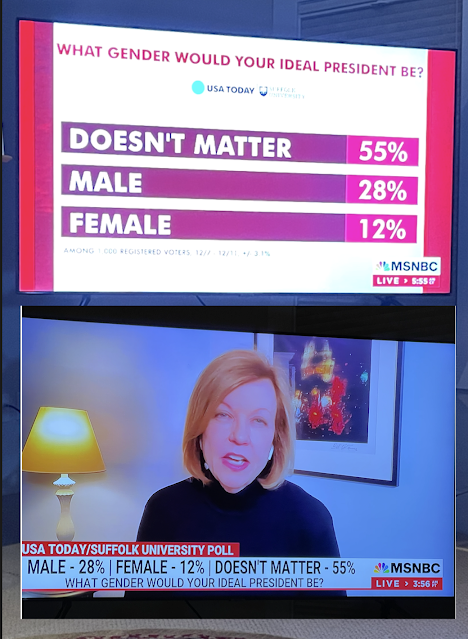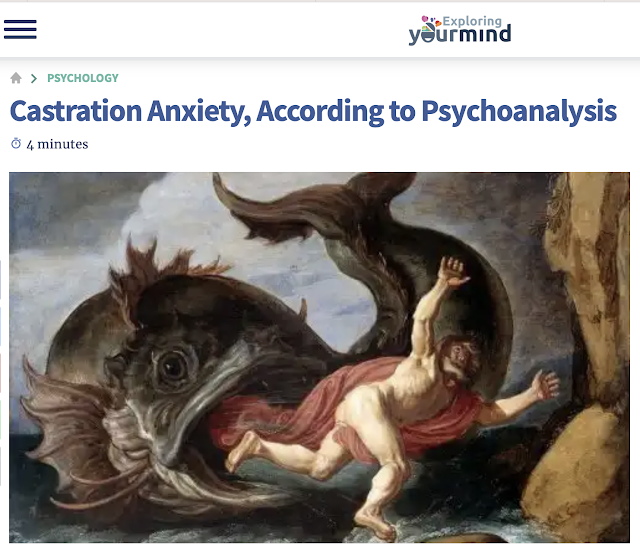Is it time for a female president? If Republicans or men prevail the answer is no.by Hal Brown The slogan and ads for Virginia Slims probably sold a lot of cigarettes, but it is interesting to note that the use of the word "baby" smacks of male chauvinism. The word "lady" could just as easily have been used. It also show bias because it reads "you've come a long way, baby" rather than simply "we've come a long way." Below you will find some of my Freudian political analysis but even the word "long" could have been chosen by advertisers of the time who were steeped in depth psychology to unconsciously appeal to women. Here's a review of The Hidden Persuaders.
Susan Page, who wrote a USA article yesterday, was on Morning Joe this morning discussing
In search of the perfect president: What Americans say they want, from age to gender
Is it time for a female president?
Maybe not.
Most voters, a 55% majority, volunteered that gender doesn't matter. That would be news to Hillary Clinton and other female candidates, who believe they encountered political headwinds because of their sex.
For a significant number of Americans, the Oval Office remains a man's world. Overall, those who expressed a preference chose a man over a woman as ideal by more than 2-1, 28%-12%.
Among Republicans, 50% said the ideal president would be male while a negligible 2% said she would be female. In contrast, Democrats with a preference chose a woman over a man by 2-1, 24%-11%.
Political independents were the most likely to say gender doesn't matter. Nearly two-thirds, 63%, volunteered that view.
Is there a gender gap on gender?
Among those voters with a preference, men by 8-1 preferred a male president over a female one, 32%-4%. Women were somewhat more likely to prefer a male president as well, 25%-19%.
I think in writing "maybe not" above, Susan Page was being optimistic. I would have written "probably not" and perhaps added that if Republicans and men had their say we won't have a woman as president in the foreseeable future.
I was trained as a psychoanalytically oriented therapist and then practiced psychodynamically informed though eclectic psychotherapy for 40 years. I often channel Freud when I try to understand behavior, beliefs, opinions, and such.
When it comes to the opinion of the men as to whether they'd be comfortable with having a woman as president one term comes to mind. It is castration anxiety. This is is a psychoanalytic concept introduced by Sigmund Freud to describe a boy's fear of loss of or damage to the genital organ as punishment for incestuous wishes toward the mother and murderous fantasies toward the rival father.
We can put it less graphically as, say, fears of emasculation, or even less so, feeling threatened by having smart, competent, and confident women in power because it makes them feel diminished.
In Freudian theory, the female counterpart of castration anxiety is penis envy. Both concepts are now quite controversial with the later being the subject of considerable debate and attempts at debunking not only in Freud's time but especially during the Women's Lib era.
The saddest part of this poll, again not a surprise, is that women who had a preference were somewhat more likely to prefer a male president as well, 25%-19%. While a 6% difference may seem insignificant to me it suggests that while since the chauvinistic 1950's, while women have come a long way, there are still many many adult women in the United States who I think have a serious self-esteem problem.
Consider the numbers: There are about 108 million women over the age of 18 in the United States. Six percent of that is about 6.5 million. My hunch is that the under 50 years of age demographic of those with a preference would rather have a female president with a much higher percentage the even younger adult women.
The poll doesn't separate middle-of-the-road and never-Trump Republicans from MAGA and far right Republicans. I think the further to the right one is the more they have a belief that men are superior to women.
I don't have polling date to confirm my, hopefully educated, hunches, but my sense is that Republican men are more likely to feel superior to women than Democrat and Independent men. I think that women married to the Republican men who have chauvinistic beliefs are more likely to have low self-esteem.
Addendum:
You can read more about castration anxiety here:
Unrelated:
This is from the scene in which the spaceship hits the Moon's eye from Marie-Georges-Jean Méliès 1902 film "A Trip to the Moon" would go on to become one of the most iconic images in cinematic history. Musk has made history by being the man in the moon who sent a rocket of his making into his own eye.















